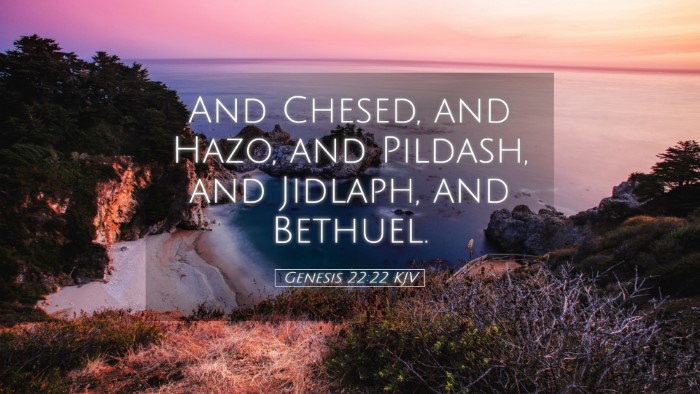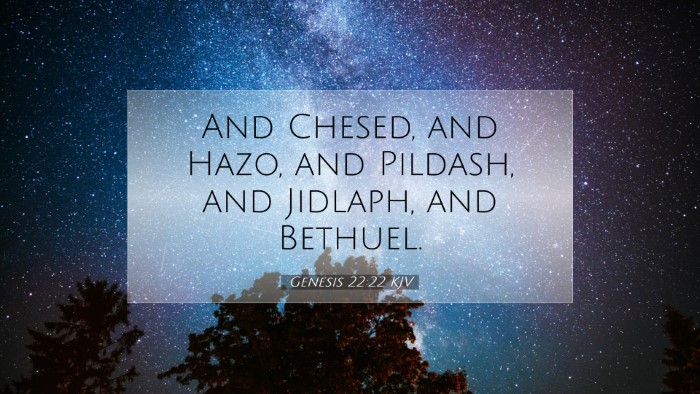Verse Context: Genesis 22:22 reads as follows: “And it came to pass after these things, that it was told Abraham, saying, Behold, Milcah, she hath also borne children unto thy brother Nahor.” This verse is part of the broader narrative concerning Abraham, the patriarch, and it sets the stage for deeper reflections on God’s promises, family lineage, and covenantal relationships.
Exegesis and Key Themes
In this verse, we see a critical juncture in Abraham’s story. The mention of Milcah and her children illustrates not only familial connections but also the unfolding of God’s promise through Abraham’s extended family.
- God's Faithfulness: As Matthew Henry notes, the verse serves as a reminder of God’s ongoing faithfulness not only to Abraham but to his lineage. The continuation of children and the mention of Nahor highlight how God's covenant extends beyond Abraham to his relatives.
- The Importance of Lineage: Adam Clarke emphasizes the significance of family in the ancient Near Eastern context. The children of Nahor represent the broader narrative of God working through families to achieve His divine purposes.
- Covenant and Promises: Albert Barnes connects this verse to the covenant God made with Abraham. While the focus on Isaac is crucial, the mention of Abraham’s brother and his descendants suggests that God’s promise encompasses a wider community.
Theological Implications
This verse raises important theological reflections on how God works through families and communities. It is significant that Milcah, the wife of Nahor, is mentioned by name, which signals her role within the genealogy and the unfolding of God’s redemptive plan.
- Redemptive History: Each name mentioned can be seen as a piece of the greater puzzle of redemptive history, as delineated by Matthew Henry. The genealogies matter in understanding God’s purpose and the unfolding history that leads to Jesus Christ.
- Relationship Dynamics: Clarke points out the relational dynamics at play, suggesting that families are often the arena where God's promises are experienced. It is within these connections that God’s providence is displayed.
- Community and Promise: Barnes believes that the mention of Nahor and his descendants highlights the communal aspect of God’s promises. The covenant with Abraham is not just an individual promise but a community blessing.
Application for Today
For pastors, students, and theologians, Genesis 22:22 presents a profound avenue for applying biblical truths in contemporary contexts. The complexities of family and God’s promises are relevant in today’s world.
- Encouragement in Family Life: This verse can serve as an encouragement to value family and understand that God can work through family ties. It reminds believers that God’s plan may often involve those we are closely related to, and His blessings can flow through those connections.
- Reflecting on Legacy: The generational aspect of this verse invites reflection on one’s legacy - what kind of spiritual family are you cultivating? What impact does your faith have on your descendants?
- Understanding God’s Covenantal Nature: It provides a unique opportunity to teach on God’s covenant—a promise that continues to impact communities today. The understanding of covenant relationships among families can foster a deeper appreciation for church family dynamics.
Conclusion
Genesis 22:22, while brief, serves as a significant verse highlighting the themes of covenant, family lineage, and God’s faithfulness. The insights from public domain commentaries by Matthew Henry, Albert Barnes, and Adam Clarke collectively enrich our understanding of the text and its implications for today’s believers. The lessons learned from this verse can encourage deeper reflection on our own familial relationships and the communal expression of God's promises through generations.


